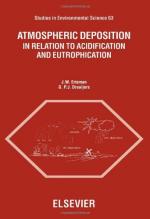|
This section contains 430 words (approx. 2 pages at 300 words per page) |

|
The process of heightened biological productivity in a body of water is call eutrophication. The major factors controlling eutrophication in a body of water, whether large, small, warm, cold, fast-moving, or quiescent, are nutrient input and rates of primary production. Not all lakes experience eutrophication. Warmth and light increase eutrophication, (which in Greek means "well nourished") if nutrient input is high enough. Cold dark lakes may be high in nutrients, but if rates of primary production are low, eutrophication does not occur. Lakes with factors that limit plant growth are called oligotrophic. Lakes with intermediate levels of biological productivity are called mesotrophic.
Many lakes around developed areas experience cultural eutrophication, or an accelerated rate of plant growth, because additional nitrates and phosphates (which encourage plant growth) flow into the lakes from human activities. Fertilizers, soil erosion and animal wastes may run off from agricultural lands, while detergents, sewage...
|
This section contains 430 words (approx. 2 pages at 300 words per page) |

|


